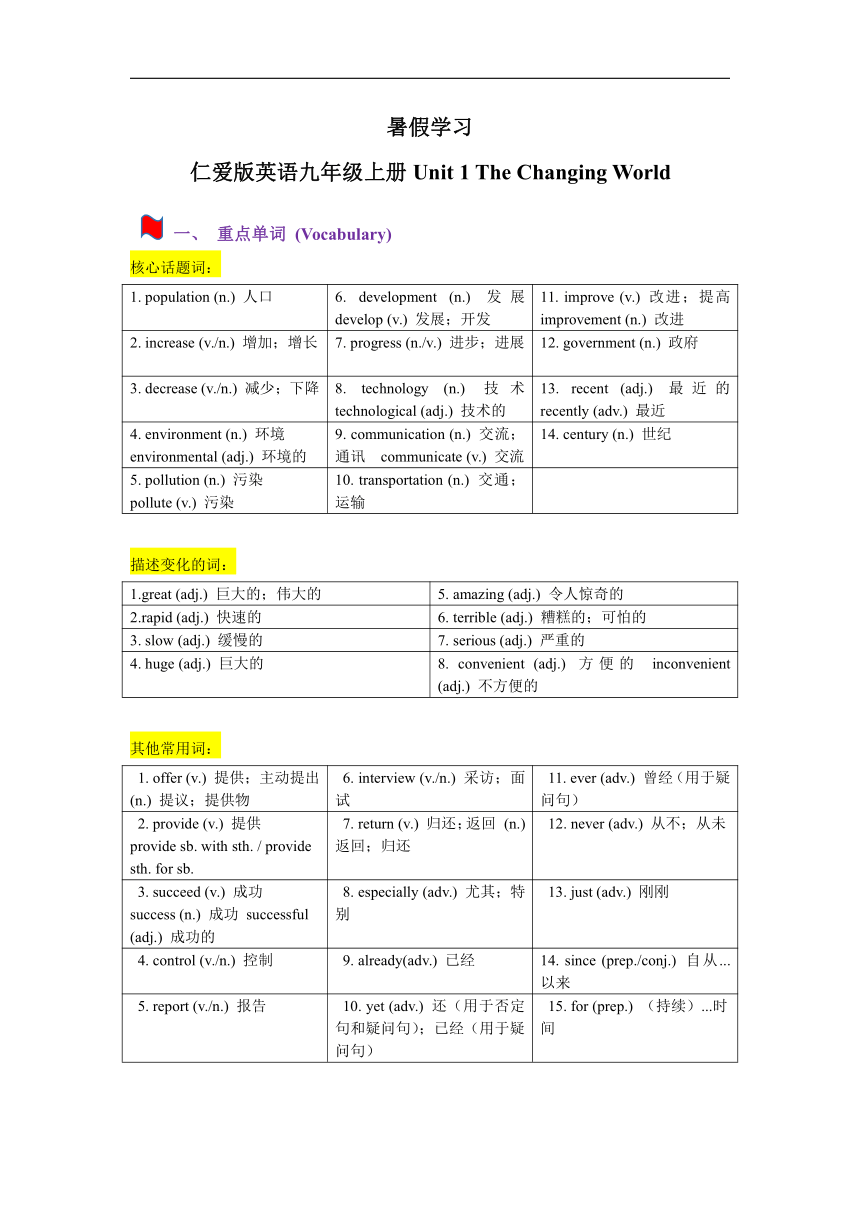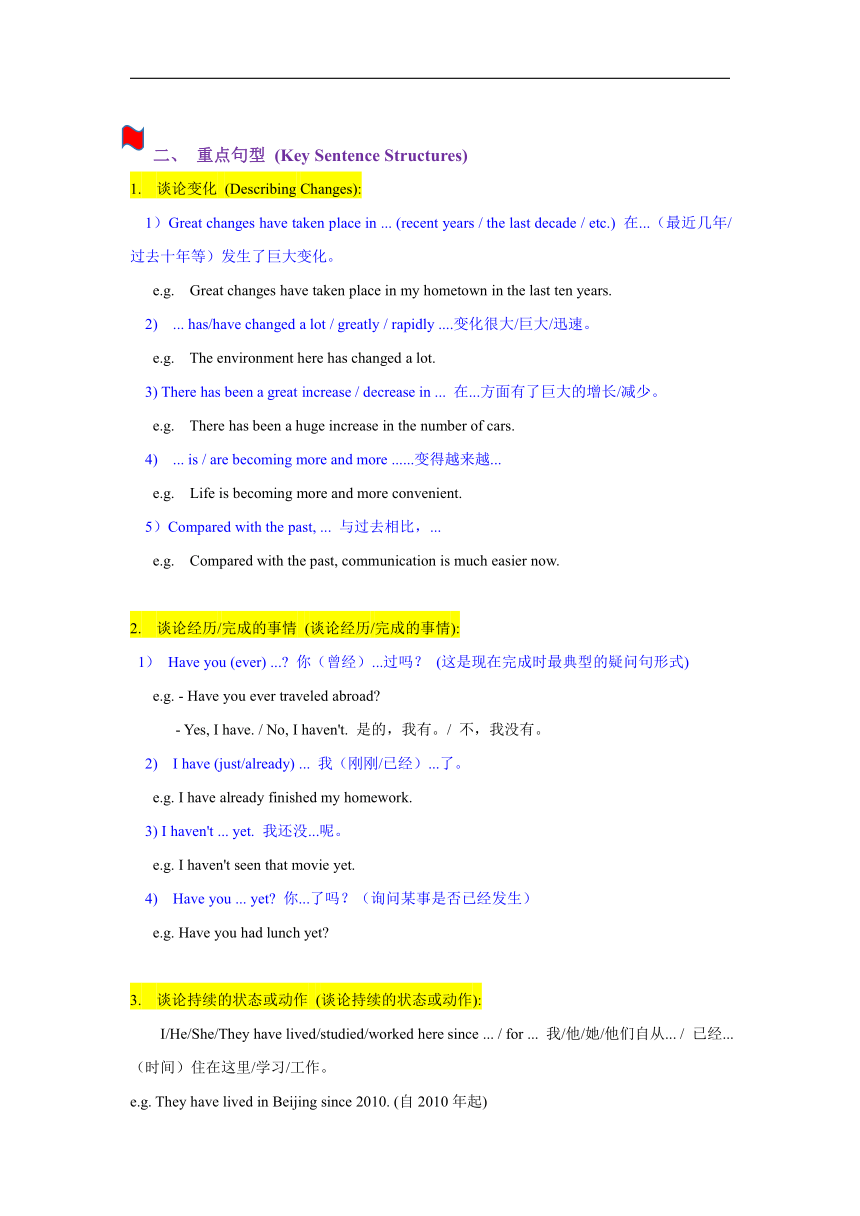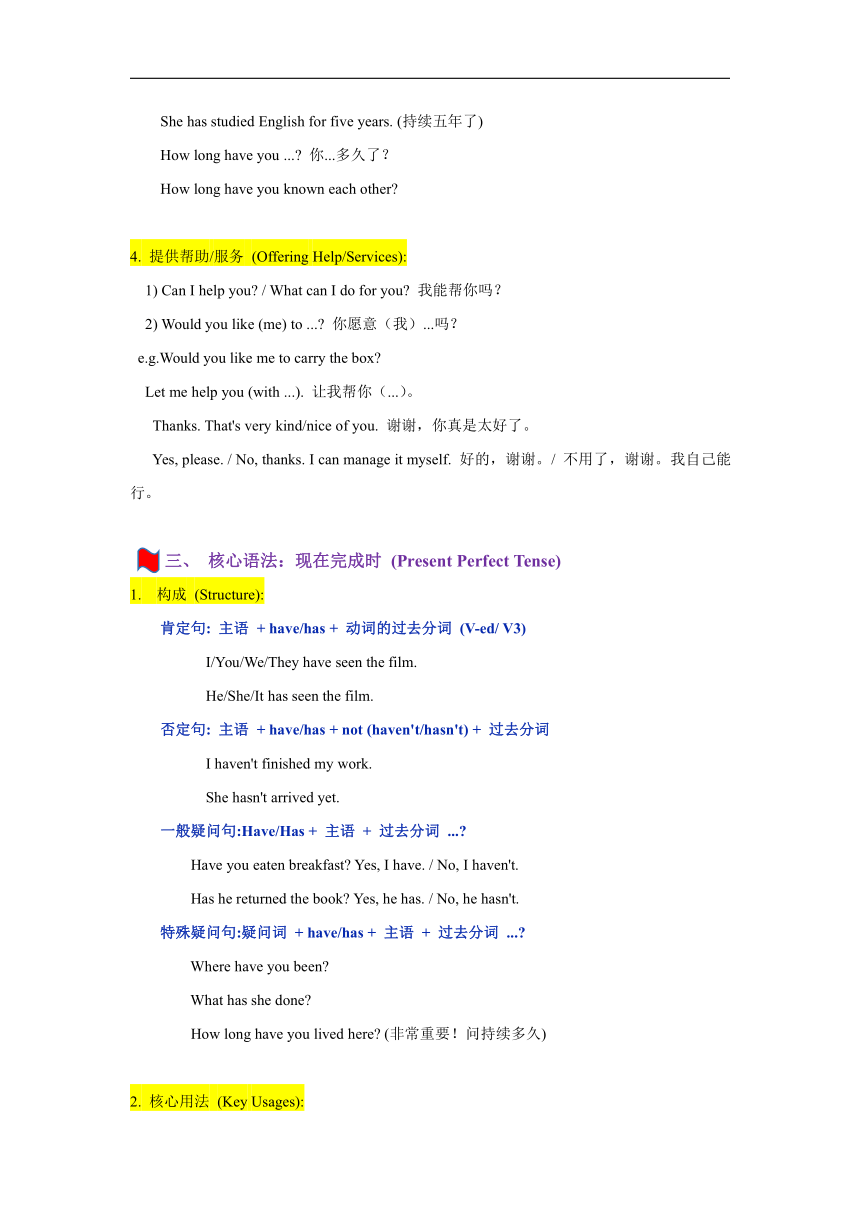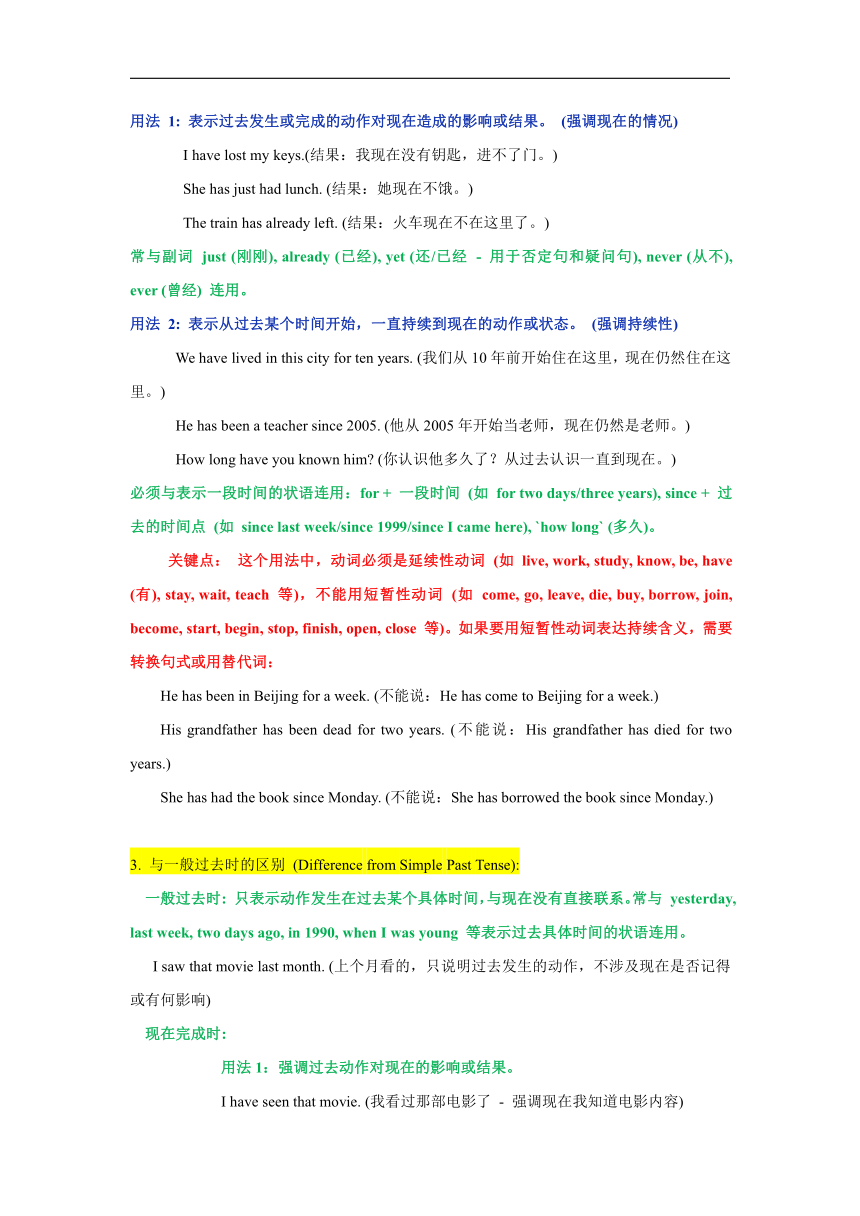暑假Unit1 The Changing World 预习(含答案)2025-2026学年仁爱科普版九年级英语上册
文档属性
| 名称 | 暑假Unit1 The Changing World 预习(含答案)2025-2026学年仁爱科普版九年级英语上册 |  | |
| 格式 | docx | ||
| 文件大小 | 40.1KB | ||
| 资源类型 | 教案 | ||
| 版本资源 | 仁爱科普版 | ||
| 科目 | 英语 | ||
| 更新时间 | 2025-07-20 08:41:01 | ||
图片预览




文档简介
暑假学习
仁爱版英语九年级上册Unit 1 The Changing World
一、 重点单词 (Vocabulary)
核心话题词:
1. population (n.) 人口 6. development (n.) 发展 develop (v.) 发展;开发 11. improve (v.) 改进;提高 improvement (n.) 改进
2. increase (v./n.) 增加;增长 7. progress (n./v.) 进步;进展 12. government (n.) 政府
3. decrease (v./n.) 减少;下降 8. technology (n.) 技术 technological (adj.) 技术的 13. recent (adj.) 最近的 recently (adv.) 最近
4. environment (n.) 环境 environmental (adj.) 环境的 9. communication (n.) 交流;通讯 communicate (v.) 交流 14. century (n.) 世纪
5. pollution (n.) 污染 pollute (v.) 污染 10. transportation (n.) 交通;运输
描述变化的词:
1.great (adj.) 巨大的;伟大的 5. amazing (adj.) 令人惊奇的
2.rapid (adj.) 快速的 6. terrible (adj.) 糟糕的;可怕的
3. slow (adj.) 缓慢的 7. serious (adj.) 严重的
4. huge (adj.) 巨大的 8. convenient (adj.) 方便的 inconvenient (adj.) 不方便的
其他常用词:
1. offer (v.) 提供;主动提出 (n.) 提议;提供物 6. interview (v./n.) 采访;面试 11. ever (adv.) 曾经(用于疑问句)
2. provide (v.) 提供 provide sb. with sth. / provide sth. for sb. 7. return (v.) 归还;返回 (n.) 返回;归还 12. never (adv.) 从不;从未
3. succeed (v.) 成功 success (n.) 成功 successful (adj.) 成功的 8. especially (adv.) 尤其;特别 13. just (adv.) 刚刚
4. control (v./n.) 控制 9. already(adv.) 已经 14. since (prep./conj.) 自从...以来
5. report (v./n.) 报告 10. yet (adv.) 还(用于否定句和疑问句);已经(用于疑问句) 15. for (prep.) (持续)...时间
二、 重点句型 (Key Sentence Structures)
1. 谈论变化 (Describing Changes):
1)Great changes have taken place in ... (recent years / the last decade / etc.) 在...(最近几年/过去十年等)发生了巨大变化。
e.g. Great changes have taken place in my hometown in the last ten years.
2) ... has/have changed a lot / greatly / rapidly ....变化很大/巨大/迅速。
e.g. The environment here has changed a lot.
3) There has been a great increase / decrease in ... 在...方面有了巨大的增长/减少。
e.g. There has been a huge increase in the number of cars.
... is / are becoming more and more ......变得越来越...
e.g. Life is becoming more and more convenient.
5)Compared with the past, ... 与过去相比,...
e.g. Compared with the past, communication is much easier now.
2. 谈论经历/完成的事情 (谈论经历/完成的事情):
1) Have you (ever) ... 你(曾经)...过吗? (这是现在完成时最典型的疑问句形式)
e.g. - Have you ever traveled abroad
- Yes, I have. / No, I haven't. 是的,我有。/ 不,我没有。
I have (just/already) ... 我(刚刚/已经)...了。
e.g. I have already finished my homework.
3) I haven't ... yet. 我还没...呢。
e.g. I haven't seen that movie yet.
4) Have you ... yet 你...了吗?(询问某事是否已经发生)
e.g. Have you had lunch yet
3. 谈论持续的状态或动作 (谈论持续的状态或动作):
I/He/She/They have lived/studied/worked here since ... / for ... 我/他/她/他们自从... / 已经...(时间)住在这里/学习/工作。
e.g. They have lived in Beijing since 2010. (自2010年起)
She has studied English for five years. (持续五年了)
How long have you ... 你...多久了?
How long have you known each other
4. 提供帮助/服务 (Offering Help/Services):
1) Can I help you / What can I do for you 我能帮你吗?
2) Would you like (me) to ... 你愿意(我)...吗?
e.g.Would you like me to carry the box
Let me help you (with ...). 让我帮你(...)。
Thanks. That's very kind/nice of you. 谢谢,你真是太好了。
Yes, please. / No, thanks. I can manage it myself. 好的,谢谢。/ 不用了,谢谢。我自己能行。
三、 核心语法:现在完成时 (Present Perfect Tense)
1. 构成 (Structure):
肯定句: 主语 + have/has + 动词的过去分词 (V-ed/ V3)
I/You/We/They have seen the film.
He/She/It has seen the film.
否定句: 主语 + have/has + not (haven't/hasn't) + 过去分词
I haven't finished my work.
She hasn't arrived yet.
一般疑问句:Have/Has + 主语 + 过去分词 ...
Have you eaten breakfast Yes, I have. / No, I haven't.
Has he returned the book Yes, he has. / No, he hasn't.
特殊疑问句:疑问词 + have/has + 主语 + 过去分词 ...
Where have you been
What has she done
How long have you lived here (非常重要!问持续多久)
2. 核心用法 (Key Usages):
用法 1: 表示过去发生或完成的动作对现在造成的影响或结果。 (强调现在的情况)
I have lost my keys.(结果:我现在没有钥匙,进不了门。)
She has just had lunch. (结果:她现在不饿。)
The train has already left. (结果:火车现在不在这里了。)
常与副词 just (刚刚), already (已经), yet (还/已经 - 用于否定句和疑问句), never (从不), ever (曾经) 连用。
用法 2: 表示从过去某个时间开始,一直持续到现在的动作或状态。 (强调持续性)
We have lived in this city for ten years. (我们从10年前开始住在这里,现在仍然住在这里。)
He has been a teacher since 2005. (他从2005年开始当老师,现在仍然是老师。)
How long have you known him (你认识他多久了?从过去认识一直到现在。)
必须与表示一段时间的状语连用:for + 一段时间 (如 for two days/three years), since + 过去的时间点 (如 since last week/since 1999/since I came here), `how long` (多久)。
关键点: 这个用法中,动词必须是延续性动词 (如 live, work, study, know, be, have (有), stay, wait, teach 等),不能用短暂性动词 (如 come, go, leave, die, buy, borrow, join, become, start, begin, stop, finish, open, close 等)。如果要用短暂性动词表达持续含义,需要转换句式或用替代词:
He has been in Beijing for a week. (不能说:He has come to Beijing for a week.)
His grandfather has been dead for two years. (不能说:His grandfather has died for two years.)
She has had the book since Monday. (不能说:She has borrowed the book since Monday.)
与一般过去时的区别 (Difference from Simple Past Tense):
一般过去时: 只表示动作发生在过去某个具体时间,与现在没有直接联系。常与 yesterday, last week, two days ago, in 1990, when I was young 等表示过去具体时间的状语连用。
I saw that movie last month. (上个月看的,只说明过去发生的动作,不涉及现在是否记得或有何影响)
现在完成时:
用法1:强调过去动作对现在的影响或结果。
I have seen that movie. (我看过那部电影了 - 强调现在我知道电影内容)
用法2:强调动作或状态从过去持续到现在。
I have lived here for 5 years. (我在这里住了5年 - 现在仍然住在这里)
关键:现在完成时总是和“现在”有联系(结果影响或持续),而一般过去时只谈过去的事。
4. have/has been to have/has gone to have/has been in (重点辨析!)
have/has been to + 地点: 曾经去过某地(现在人已回来)。强调经历。
She has been to London twice. (她去过伦敦两次 - 现在不在伦敦)
have/has gone to + 地点: 已经去了某地(现在人已到达或在去的途中,不在此地)。
- Where is Tom
-He has gone to the library.
(汤姆去图书馆了 - 现在不在这里,可能在图书馆或在去的路上)
have/has been in/at + 地点: 已经在某地待了多久(强调在某个地方停留的状态,常与 for/since 连用)。
They have been in Shanghai for three weeks. (他们在上海待了三周了 - 现在还在上海)
四、 知识练习 (Practice Exercises)
练习 1: 词汇运用 (选词填空)
population, environment, development, convenient, especially, provide, succeeded, government, increased, communication
1. The rapid ___________ of technology has changed our lives a lot.
2. The ___________ in this area is working hard to control pollution.
3. Online shopping is very ___________ because you can buy things without leaving home.
4. The world's ___________ is growing very fast, which brings many challenges.
5. We need to protect the ___________ for future generations.
6. The internet has made ___________ much easier and faster.
7. The company has ___________ in developing a new kind of energy-saving car.
8. The school library ___________ students with many books and magazines.
9. The price of vegetables has ___________ a lot recently.
10. I love all fruits, ___________ apples and bananas.
练习 2: 现在完成时填空 (用括号内动词的现在完成时形式填空)
1. -________ you ever ________ (visit) the Great Wall -Yes, I ________.
2. My brother ________ just ________ (buy) a new bike.
3. We ________ (not finish) our project yet.
4. How long ________ Mr. Smith ________ (teach) in this school (For/Since )
5. — Where is Lucy — She ________ (go) to the supermarket.
6. I ________ (know) Li Ming since we were in primary school.
7. They ________ (be) to Hainan twice. They love it there.
8. The train ________ (leave) already. We have to wait for the next one.
9. ________ you ________ (see) my glasses I can't find them anywhere.
10. He ________ (live) in Beijing for ten years. He moved there in 2014.
练习 3: 句型转换
1. I arrived here two hours ago. (用现在完成时改写,强调现在还在)
I ________ ________ here ________ two hours.
2. She borrowed the book last Friday. (用现在完成时改写,强调她现在有这本书吗?)
She ________ ________ the book ________ last Friday. (注意:borrow是非延续性动词)
3. They started learning English five years ago. (用现在完成时改写,强调持续学习到现在)
They ________ ________ English ________ five years.
4. Have you finished your homework (用 yet 改写疑问句)
________ you finished your homework ________
5. The meeting began at 9 o'clock. It's still going on now. (合并为一句,用现在完成时)
The meeting ________ ________ ________ for ________ (since 9 o'clock).
练习 4: 翻译句子 (中译英)
我的家乡最近几年发生了巨大的变化。(take place)
____________________________________________________________________
你曾经坐过飞机吗?(ever)
____________________________________________________________________
他已经把书还回图书馆了。(return)
____________________________________________________________________
史密斯先生在这所大学教书多久了?(how long)
____________________________________________________________________
她还没吃早饭呢。(yet)
____________________________________________________________________
自从我上次见到你,已经过去三年了。(since)
____________________________________________________________________
互联网使交流变得更加方便了。(make...convenient)
____________________________________________________________________
政府正在努力控制人口增长。(control, population growth)
____________________________________________________________________
练习 5: 写作
以“Changes in My Hometown/Life”为题,写一篇80词左右的短文。运用本单元所学词汇、句型和现在完成时态描述变化。
What changes have happened (e.g., buildings, roads, environment, lifestyle...)
How do you feel about these changes (positive/negative )
What changes do you hope to see in the future
Changes in My __________
__________________________________________________________________________________________________________________________________________________________________________________________________________________________________________________________________________________________________________________________________________________________________________________________________________________________________________________________________________________________
参考答案 (Answer Key)
练习 1: 词汇运用
1. development 2. government 3. convenient 4. population 5. environment
6. communication 7. succeeded 8. provides 9. increased 10. especially
练习 2: 现在完成时填空
1. Have ... visited, have 2. has ... bought 3. haven't finished 4. has ... taught 5. has gone 6. have known 7. have been 8. has left 9. Have ... seen 10. has lived
练习 3: 句型转换
1. have been, for
2. has had, since (borrow是非延续性动词,表示“拥有”这个状态持续用have)
3. have learned /learnt /have been learning, for
4. Have, yet
5. has been on, since (begin是非延续性动词,表示会议“进行”的状态用be on)
练习 4: 翻译句子
1. Great changes have taken place in my hometown in recent years.
2. Have you ever taken a plane / Have you ever traveled by plane
3. He has already returned the book to the library.
4. How long has Mr. Smith taught in this university
5. She hasn't had breakfast yet.
6. It has been three years since I last saw you. / Three years have passed since I last saw you.
7. The Internet has made communication more convenient.
8. The government is trying hard to control population growth.
练习 5: 写作
Changes in My Hometown
My hometown has changed greatly in recent years. In the past, the streets were narrow and crowded, and there were few green spaces. Air pollution was sometimes a problem.
Now, our hometown is more modern and beautiful. The roads are wider and cleaner. Many new parks and trees have been planted, making the air fresher. Tall buildings, modern shops, and large supermarkets have been built. Public transportation like buses is also more convenient.
People enjoy a better life with more activities, such as square dancing in the evenings. I love my hometown more now!
仁爱版英语九年级上册Unit 1 The Changing World
一、 重点单词 (Vocabulary)
核心话题词:
1. population (n.) 人口 6. development (n.) 发展 develop (v.) 发展;开发 11. improve (v.) 改进;提高 improvement (n.) 改进
2. increase (v./n.) 增加;增长 7. progress (n./v.) 进步;进展 12. government (n.) 政府
3. decrease (v./n.) 减少;下降 8. technology (n.) 技术 technological (adj.) 技术的 13. recent (adj.) 最近的 recently (adv.) 最近
4. environment (n.) 环境 environmental (adj.) 环境的 9. communication (n.) 交流;通讯 communicate (v.) 交流 14. century (n.) 世纪
5. pollution (n.) 污染 pollute (v.) 污染 10. transportation (n.) 交通;运输
描述变化的词:
1.great (adj.) 巨大的;伟大的 5. amazing (adj.) 令人惊奇的
2.rapid (adj.) 快速的 6. terrible (adj.) 糟糕的;可怕的
3. slow (adj.) 缓慢的 7. serious (adj.) 严重的
4. huge (adj.) 巨大的 8. convenient (adj.) 方便的 inconvenient (adj.) 不方便的
其他常用词:
1. offer (v.) 提供;主动提出 (n.) 提议;提供物 6. interview (v./n.) 采访;面试 11. ever (adv.) 曾经(用于疑问句)
2. provide (v.) 提供 provide sb. with sth. / provide sth. for sb. 7. return (v.) 归还;返回 (n.) 返回;归还 12. never (adv.) 从不;从未
3. succeed (v.) 成功 success (n.) 成功 successful (adj.) 成功的 8. especially (adv.) 尤其;特别 13. just (adv.) 刚刚
4. control (v./n.) 控制 9. already(adv.) 已经 14. since (prep./conj.) 自从...以来
5. report (v./n.) 报告 10. yet (adv.) 还(用于否定句和疑问句);已经(用于疑问句) 15. for (prep.) (持续)...时间
二、 重点句型 (Key Sentence Structures)
1. 谈论变化 (Describing Changes):
1)Great changes have taken place in ... (recent years / the last decade / etc.) 在...(最近几年/过去十年等)发生了巨大变化。
e.g. Great changes have taken place in my hometown in the last ten years.
2) ... has/have changed a lot / greatly / rapidly ....变化很大/巨大/迅速。
e.g. The environment here has changed a lot.
3) There has been a great increase / decrease in ... 在...方面有了巨大的增长/减少。
e.g. There has been a huge increase in the number of cars.
... is / are becoming more and more ......变得越来越...
e.g. Life is becoming more and more convenient.
5)Compared with the past, ... 与过去相比,...
e.g. Compared with the past, communication is much easier now.
2. 谈论经历/完成的事情 (谈论经历/完成的事情):
1) Have you (ever) ... 你(曾经)...过吗? (这是现在完成时最典型的疑问句形式)
e.g. - Have you ever traveled abroad
- Yes, I have. / No, I haven't. 是的,我有。/ 不,我没有。
I have (just/already) ... 我(刚刚/已经)...了。
e.g. I have already finished my homework.
3) I haven't ... yet. 我还没...呢。
e.g. I haven't seen that movie yet.
4) Have you ... yet 你...了吗?(询问某事是否已经发生)
e.g. Have you had lunch yet
3. 谈论持续的状态或动作 (谈论持续的状态或动作):
I/He/She/They have lived/studied/worked here since ... / for ... 我/他/她/他们自从... / 已经...(时间)住在这里/学习/工作。
e.g. They have lived in Beijing since 2010. (自2010年起)
She has studied English for five years. (持续五年了)
How long have you ... 你...多久了?
How long have you known each other
4. 提供帮助/服务 (Offering Help/Services):
1) Can I help you / What can I do for you 我能帮你吗?
2) Would you like (me) to ... 你愿意(我)...吗?
e.g.Would you like me to carry the box
Let me help you (with ...). 让我帮你(...)。
Thanks. That's very kind/nice of you. 谢谢,你真是太好了。
Yes, please. / No, thanks. I can manage it myself. 好的,谢谢。/ 不用了,谢谢。我自己能行。
三、 核心语法:现在完成时 (Present Perfect Tense)
1. 构成 (Structure):
肯定句: 主语 + have/has + 动词的过去分词 (V-ed/ V3)
I/You/We/They have seen the film.
He/She/It has seen the film.
否定句: 主语 + have/has + not (haven't/hasn't) + 过去分词
I haven't finished my work.
She hasn't arrived yet.
一般疑问句:Have/Has + 主语 + 过去分词 ...
Have you eaten breakfast Yes, I have. / No, I haven't.
Has he returned the book Yes, he has. / No, he hasn't.
特殊疑问句:疑问词 + have/has + 主语 + 过去分词 ...
Where have you been
What has she done
How long have you lived here (非常重要!问持续多久)
2. 核心用法 (Key Usages):
用法 1: 表示过去发生或完成的动作对现在造成的影响或结果。 (强调现在的情况)
I have lost my keys.(结果:我现在没有钥匙,进不了门。)
She has just had lunch. (结果:她现在不饿。)
The train has already left. (结果:火车现在不在这里了。)
常与副词 just (刚刚), already (已经), yet (还/已经 - 用于否定句和疑问句), never (从不), ever (曾经) 连用。
用法 2: 表示从过去某个时间开始,一直持续到现在的动作或状态。 (强调持续性)
We have lived in this city for ten years. (我们从10年前开始住在这里,现在仍然住在这里。)
He has been a teacher since 2005. (他从2005年开始当老师,现在仍然是老师。)
How long have you known him (你认识他多久了?从过去认识一直到现在。)
必须与表示一段时间的状语连用:for + 一段时间 (如 for two days/three years), since + 过去的时间点 (如 since last week/since 1999/since I came here), `how long` (多久)。
关键点: 这个用法中,动词必须是延续性动词 (如 live, work, study, know, be, have (有), stay, wait, teach 等),不能用短暂性动词 (如 come, go, leave, die, buy, borrow, join, become, start, begin, stop, finish, open, close 等)。如果要用短暂性动词表达持续含义,需要转换句式或用替代词:
He has been in Beijing for a week. (不能说:He has come to Beijing for a week.)
His grandfather has been dead for two years. (不能说:His grandfather has died for two years.)
She has had the book since Monday. (不能说:She has borrowed the book since Monday.)
与一般过去时的区别 (Difference from Simple Past Tense):
一般过去时: 只表示动作发生在过去某个具体时间,与现在没有直接联系。常与 yesterday, last week, two days ago, in 1990, when I was young 等表示过去具体时间的状语连用。
I saw that movie last month. (上个月看的,只说明过去发生的动作,不涉及现在是否记得或有何影响)
现在完成时:
用法1:强调过去动作对现在的影响或结果。
I have seen that movie. (我看过那部电影了 - 强调现在我知道电影内容)
用法2:强调动作或状态从过去持续到现在。
I have lived here for 5 years. (我在这里住了5年 - 现在仍然住在这里)
关键:现在完成时总是和“现在”有联系(结果影响或持续),而一般过去时只谈过去的事。
4. have/has been to have/has gone to have/has been in (重点辨析!)
have/has been to + 地点: 曾经去过某地(现在人已回来)。强调经历。
She has been to London twice. (她去过伦敦两次 - 现在不在伦敦)
have/has gone to + 地点: 已经去了某地(现在人已到达或在去的途中,不在此地)。
- Where is Tom
-He has gone to the library.
(汤姆去图书馆了 - 现在不在这里,可能在图书馆或在去的路上)
have/has been in/at + 地点: 已经在某地待了多久(强调在某个地方停留的状态,常与 for/since 连用)。
They have been in Shanghai for three weeks. (他们在上海待了三周了 - 现在还在上海)
四、 知识练习 (Practice Exercises)
练习 1: 词汇运用 (选词填空)
population, environment, development, convenient, especially, provide, succeeded, government, increased, communication
1. The rapid ___________ of technology has changed our lives a lot.
2. The ___________ in this area is working hard to control pollution.
3. Online shopping is very ___________ because you can buy things without leaving home.
4. The world's ___________ is growing very fast, which brings many challenges.
5. We need to protect the ___________ for future generations.
6. The internet has made ___________ much easier and faster.
7. The company has ___________ in developing a new kind of energy-saving car.
8. The school library ___________ students with many books and magazines.
9. The price of vegetables has ___________ a lot recently.
10. I love all fruits, ___________ apples and bananas.
练习 2: 现在完成时填空 (用括号内动词的现在完成时形式填空)
1. -________ you ever ________ (visit) the Great Wall -Yes, I ________.
2. My brother ________ just ________ (buy) a new bike.
3. We ________ (not finish) our project yet.
4. How long ________ Mr. Smith ________ (teach) in this school (For/Since )
5. — Where is Lucy — She ________ (go) to the supermarket.
6. I ________ (know) Li Ming since we were in primary school.
7. They ________ (be) to Hainan twice. They love it there.
8. The train ________ (leave) already. We have to wait for the next one.
9. ________ you ________ (see) my glasses I can't find them anywhere.
10. He ________ (live) in Beijing for ten years. He moved there in 2014.
练习 3: 句型转换
1. I arrived here two hours ago. (用现在完成时改写,强调现在还在)
I ________ ________ here ________ two hours.
2. She borrowed the book last Friday. (用现在完成时改写,强调她现在有这本书吗?)
She ________ ________ the book ________ last Friday. (注意:borrow是非延续性动词)
3. They started learning English five years ago. (用现在完成时改写,强调持续学习到现在)
They ________ ________ English ________ five years.
4. Have you finished your homework (用 yet 改写疑问句)
________ you finished your homework ________
5. The meeting began at 9 o'clock. It's still going on now. (合并为一句,用现在完成时)
The meeting ________ ________ ________ for ________ (since 9 o'clock).
练习 4: 翻译句子 (中译英)
我的家乡最近几年发生了巨大的变化。(take place)
____________________________________________________________________
你曾经坐过飞机吗?(ever)
____________________________________________________________________
他已经把书还回图书馆了。(return)
____________________________________________________________________
史密斯先生在这所大学教书多久了?(how long)
____________________________________________________________________
她还没吃早饭呢。(yet)
____________________________________________________________________
自从我上次见到你,已经过去三年了。(since)
____________________________________________________________________
互联网使交流变得更加方便了。(make...convenient)
____________________________________________________________________
政府正在努力控制人口增长。(control, population growth)
____________________________________________________________________
练习 5: 写作
以“Changes in My Hometown/Life”为题,写一篇80词左右的短文。运用本单元所学词汇、句型和现在完成时态描述变化。
What changes have happened (e.g., buildings, roads, environment, lifestyle...)
How do you feel about these changes (positive/negative )
What changes do you hope to see in the future
Changes in My __________
__________________________________________________________________________________________________________________________________________________________________________________________________________________________________________________________________________________________________________________________________________________________________________________________________________________________________________________________________________________________
参考答案 (Answer Key)
练习 1: 词汇运用
1. development 2. government 3. convenient 4. population 5. environment
6. communication 7. succeeded 8. provides 9. increased 10. especially
练习 2: 现在完成时填空
1. Have ... visited, have 2. has ... bought 3. haven't finished 4. has ... taught 5. has gone 6. have known 7. have been 8. has left 9. Have ... seen 10. has lived
练习 3: 句型转换
1. have been, for
2. has had, since (borrow是非延续性动词,表示“拥有”这个状态持续用have)
3. have learned /learnt /have been learning, for
4. Have, yet
5. has been on, since (begin是非延续性动词,表示会议“进行”的状态用be on)
练习 4: 翻译句子
1. Great changes have taken place in my hometown in recent years.
2. Have you ever taken a plane / Have you ever traveled by plane
3. He has already returned the book to the library.
4. How long has Mr. Smith taught in this university
5. She hasn't had breakfast yet.
6. It has been three years since I last saw you. / Three years have passed since I last saw you.
7. The Internet has made communication more convenient.
8. The government is trying hard to control population growth.
练习 5: 写作
Changes in My Hometown
My hometown has changed greatly in recent years. In the past, the streets were narrow and crowded, and there were few green spaces. Air pollution was sometimes a problem.
Now, our hometown is more modern and beautiful. The roads are wider and cleaner. Many new parks and trees have been planted, making the air fresher. Tall buildings, modern shops, and large supermarkets have been built. Public transportation like buses is also more convenient.
People enjoy a better life with more activities, such as square dancing in the evenings. I love my hometown more now!
同课章节目录
- Unit 1 The Changing World
- Topic 1 Our country has developed rapidly.
- Topic 2 The population in developing countries is
- Topic 3 The world has changed for the better.
- Unit 2 Saving the earth.
- Topic 1 Pollution has causes too many problems.
- Topic 2 All these problems are very serious.
- Topic 3 What can we do to protect the environment
- Unit 3 English around the World
- Topic 1 English is widely spoken around the world.
- Topic 2 Some things usually have different meaning
- Topic 3 Could you give us some advice on how to l
- Unit 4 Amazing Science
- Topic 1 When was it invented?
- Topic 2 I'm excited about the things that will be
- Topic 3 China is the third nation that sent a pers
